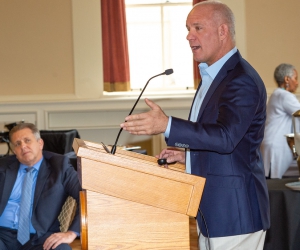
Healthy Lifestyle Institute Summit Promotes Health and Lifestyle Research
The University of Pittsburgh’s second annual Healthy Lifestyle Institute (HLI) Summit focused on emerging research that is examining health and lifestyle conditions across the whole human lifespan and in environments all over the world.
Held this past December, the HLI Summit drew nearly 100 people from across the University of Pittsburgh, in fields ranging from education to nursing to economics. The HLI is part of the Pitt School of Education and seeks to improve health and well-being with a focus on lifestyle factors such as physical activity, sleep, diet and others.
The presentations at the HLI Summit addressed new and impactful research around the conference’s theme of “Transforming Lifestyle Research to Health and Well-Being.” The feature session focused on the intersection of lifestyle and biology related to cardiovascular disease and aging.
“The goal of the summit was to reimagine our collaborative efforts and to position Pitt as the leading institution in health and lifestyle research regionally, nationally, and internationally,” said John Jakicic, who is the chair of the Pitt School of Education’s Health and Physical Activity department, the director of HLI, and a Distinguished Professor at the University of Pittsburgh.
The summit’s keynote speaker was Dr. Timothy Church, the chief medical officer of ACAP Health Consulting in Dallas, Texas and a professor at Pennington Biomedical Research Center in Baton Rouge, La.
Church used his talk to give “real-world” advice about the challenges—and opportunities—of transitioning from working in academia to working in industry. The professor-turned-business-man filled his talk with examples, strategies, and personal anecdotes how who to engage business and industry in becoming interested and engaged in promoting health and well-being.
The summit also highlighted faculty from across Pitt whose received pilot and feasibility funding this past year. Preliminary data were presented on the impact of a mobile green grocer to provide afford food in low resource communities, lifestyle behaviors among healthcare providers, and the maternal-infant transmission of obesity risk.
Moreover, the HLI has provided funding for an additional five projects to faculty in education, nursing, economics, and the rehabilitation sciences. Their research covers a range of topics—the impact of noise pollution from wind turbines on sleep, the rise of unhealthy eating behaviors in Kenya as the country becomes more affluent, biomechanics and movement in adults with obesity who engage in different levels of physical activity, and developing an intranet-based lifestyle behavior intervention for individuals with physical, cognitive, and sensory disabilities.
Shannon Ross was one of two faculty at Pitt Education to receive research support. Her project will examine how best to promote physical activity in the home environment for Latino preschool children and their families.
“This pilot funding is instrumental for our understanding of this area,” said Ross. “With this new knowledge, we will obtain important pilot data that will be used to apply for a larger extramural grant to test the effectiveness of a home-based, culturally-tailored intervention to prevent obesity in Latino preschool children.”
Jakicic closed the summit by announcing the HLI’s new “Schools On the Move” initiative. The institute will provide a total of $40,000 in grants to support innovative health initiatives at 43 schools in the Pittsburgh area.
“It’s amazing what these creative teachers can do if you give them just a little funding,” said Jakicic, who also serves as chair of the Department of Health and Physical Activity in the School of Education. “We’re really interested in seeing how these projects unfold.”




